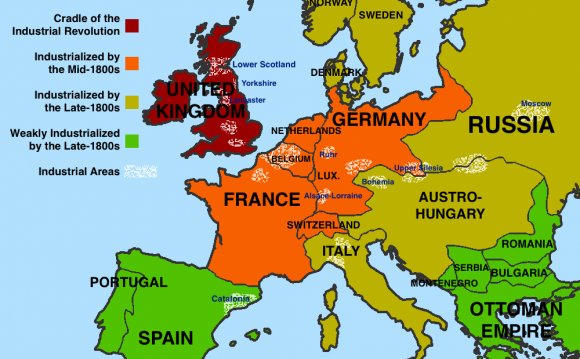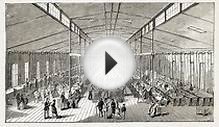
 The industrial revolution in Europe didn't happen overnight but only spread over the continent very gradually. One of the triggers was the unusually high growth in the population which set in around the middle of the 18th century and produced a gigantic reservoir of workers. At the same time new, more efficient methods of production became necessary in order to supply the basic needs of so many people. In this situation Great Britain enjoyed two important advantages: an extremely productive and wealthy agricultural system, and an astonishing number of creative inventors. This was why the United Kingdom dictated the rhythm of progress to the rest of Europe from 1750 onwards for the next century or so.
The industrial revolution in Europe didn't happen overnight but only spread over the continent very gradually. One of the triggers was the unusually high growth in the population which set in around the middle of the 18th century and produced a gigantic reservoir of workers. At the same time new, more efficient methods of production became necessary in order to supply the basic needs of so many people. In this situation Great Britain enjoyed two important advantages: an extremely productive and wealthy agricultural system, and an astonishing number of creative inventors. This was why the United Kingdom dictated the rhythm of progress to the rest of Europe from 1750 onwards for the next century or so.
The first spinning frames were created on the British Isles. These were followed by mechanical weaving looms, and it was not long before textile factories were shooting out of the ground. At the same time a boom in the iron industry broke out. As soon as people discovered how to turn coal into coke iron manufacturers had excellent, almost unlimited reserves of fuel at their disposal with which to process iron ore. Once steam engines were introduced to heat the furnace ovens more quickly and effectively, the skylines in the coal regions were quickly covered in colliery towers and the chimney stacks of iron works.
Workers poured into the new industrial centres and in a few years villages exploded into major cities: here the masses were forced to live under appalling conditions in crowded slums and damp cellars. Working hours were around 14 hours a day and the workers were slaves to the rhythm of the machines. Women were expected to work just as hard for less pay, especially in the collieries and textile factories. Children too were unscrupulously exploited. The workers lived in constant fear of unemployment and hunger. Their desperation often exploded into bloody acts of rebellion. Machine-breakers tried in vain to put a brake on developments, but the new inventions fitted together like cogs in a wheel. Improved steel production led to more rails with which to transport steel steam locomotives drawing wagons full of coke and steel.
France was a major industrial competitor on an equal level with Great Britain. As early as the 18th century, supplies of cotton to the textile factories rose five times as quickly as in the British Isles. French manufacturers concentrated on finished products. These were often luxury goods like woven silk, china and leather goods. Such traditional trades were the first to be mechanised and this explains why the first major strikes happened in the silk-processing industries. Skilled workers in Lyons took industrial action in the 1830s to force the introduction of minimum wages. Since France has relatively few resources of coal and iron, collieries and ironworks only began to appear in the middle of the 19th century to cater for the growing railway industry. Slowly but surely the focus of employment began to switch from the agrarian sector to industrial production.
The industrial revolution in Europe had very different features. Belgium, one of the first industrialised countries, was able to draw on rich resources of iron ore and coal and a strong tradition of textile manufacturing. For this reason industrial development ran along similar lines to that in Great Britain. In Switzerland too, structural development developed at a relatively early stage but in a completely different manner. Here people compensated for the lack of raw materials by specialising in niche products from silk weaving, cotton processing and engineering, including clock-making. By contrast, although the countries on the edge of the continent – Spain, Greece and the Balkan countries – were able to increase their exports of agrarian products and raw materials, they continued to lag behind in industrial production for many years.
RELATED VIDEO












